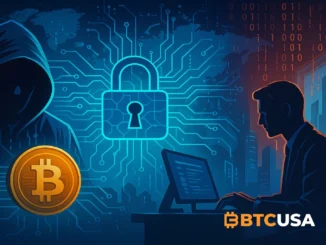
The U.S. Department of Justice has charged Rostislav Panev, a 51-year-old dual Russian-Israeli national, for allegedly being part of the LockBit ransomware group. Panev was arrested in Israel this August while awaiting extradition to the U.S. for charges relating to creating ransomware tools. He is said to have received over $230,000 in cryptocurrency payments for his work.
What is LockBit?
LockBit is a highly active ransomware group blamed for widespread cyberattacks worldwide. Since the group first appeared in 2019, it has attacked well-known companies such as Boeing, the UK’s Royal Mail, and financial institutions such as the Industrial & Commercial Bank of China. LockBit has caused billions in damages, extorting more than $500 million from over 2,500 victims across 120 countries. Its operations depend on skilled developers like Panev and affiliates who conduct the attacks.
Ransomware attacks usually encrypt the victims’ data; the attackers then ask for cryptocurrency payments in return for the decryption keys. However, even with international efforts to disrupt their activities, LockBit continues to be a very active cyber threat.
Telegram and Cryptocurrency Connections
Reportedly, Panev reached out to LockBit members via the popular among cybercriminals messaging app Telegram for its end-to-end encryption and privacy features. He received payments through cryptocurrency mixing services, a well- known attempt to mask origins in transactions involved in ransomware.
According to investigators, the actions of Panev entailed developing malware for taking down antivirus systems, conducting deployments of ransomware, and spreading ransom notes throughout targeted networks.
Developer or Accidental Accomplice?
The defense attorney for Panev, Sharon Nahari, said he was just a software developer who had no idea that the tools he was developing would be used for malicious means. Investigators, however, said his work was crucial in LockBit’s ransomware operations. Investigators said Panev has cooperated with law enforcement and provided information about his activities and role within the group.
Ongoing Battle Against Ransomware
International law enforcement agencies have ramped up efforts to take down ransomware groups like LockBit. In February, US and UK authorities disrupted the group’s infrastructure, seizing its servers, websites, and decryption keys. But LockBit remains operational, a sign of how hard it is to dismantle cybercrime networks.
The arrest of Panev is a crucial step in the ongoing global prosecution effort. Meanwhile, LockBit’s alleged leader, Dmitry Khoroshev, remains at large, with the U.S. government offering a $10 million reward for information leading to his capture.
The case of Panev illustrates the complex connections between ransomware operations, cryptocurrency, and encrypted communication, putting into focus the continued threat of cybercriminal organizations.


